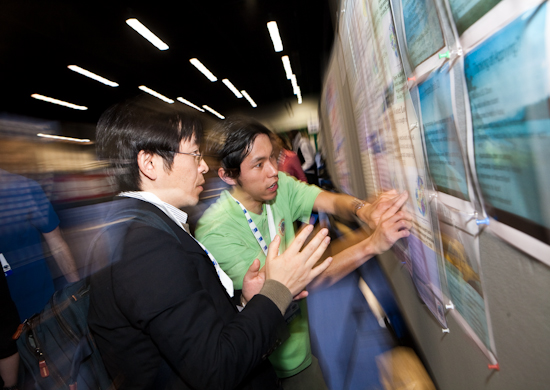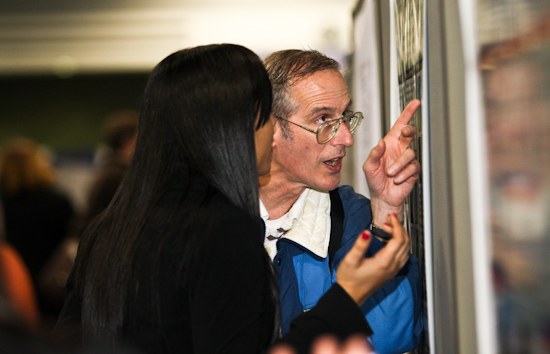 . . . but we may have neglected to mention that it would be the coolest weather-related cake you’ve ever seen! The confectionary delight was a highlight of Monday’s AMS book launch party and celebrated the 2009 release of The AMS Weather Book by Jack Williams.
. . . but we may have neglected to mention that it would be the coolest weather-related cake you’ve ever seen! The confectionary delight was a highlight of Monday’s AMS book launch party and celebrated the 2009 release of The AMS Weather Book by Jack Williams.
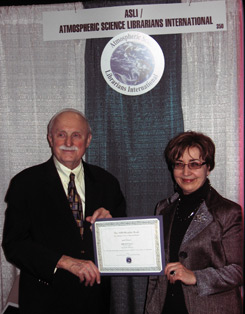
A few minutes later, in a special ceremony, the accolades for Jack continued when he received an honorable mention ASLI’s Choice Award in the “popular” category. The fifth annual ASLI’s Choice Awards ceremony will be held on Wednesday at 4:45 p.m. at Publisher’s Row in the Exhibit Hall.
Congratulations to Jack on the success of his book!
A World View at the International Forum
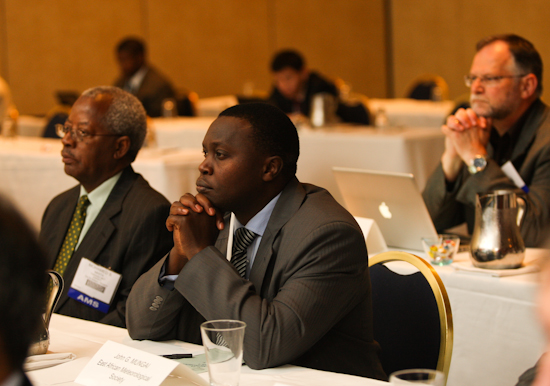


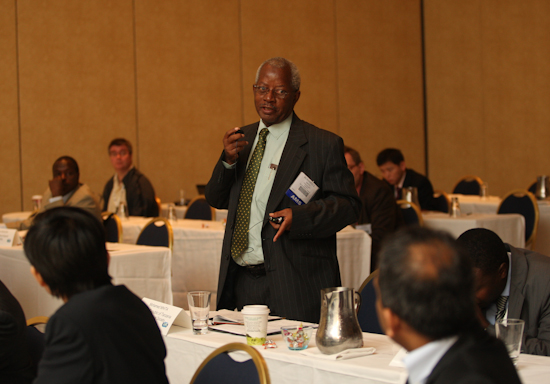
K-12 Education at Home and Abroad
The rewards of teaching the Earth sciences at the K-12 level in the United States are great, but sometimes so are the frustrations. At Monday’s education forum, Sandra Henderson touched on some of these issues in a discussion of recent UCAR surveys of K-12 Earth science teachers.
UCAR, which supports the professional development of science teachers through their “Windows to the Universe” website and other initiatives, generated almost 1,000 responses from National Earth Science Teachers Association (NESTA) members and newsletter subscribers. While making note of one particularly positive development–that teachers now have reasonably good access to technology and utilize it regularly–Henderson also listed the top 10 concerns of science teachers and summarized the surveys’ findings.
So how can these concerns be addressed? American educators might look to their colleagues across the Pacific for a uniquely successful approach to environmental education. In another forum presentation, Michihiko Tonouchi of the Japan Meteorological Business Support Center in Tokyo described a program in Japanese public schools that teaches students about global warming and other environmental issues.
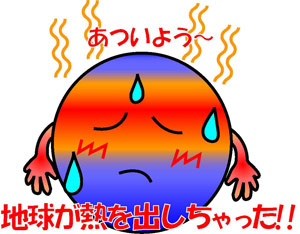
Weather studies in Japan are now a compulsory subject for elementary school fifth-graders and those in their second year of junior-high school. In the program described by Tonouchi, approximately 100 broadcast meteorologists from the Weather Caster Network (WCN) and 300 engineers from Sharp share teaching responsibilities, with the broadcasters explaining basic scientific principles of global warming and the engineers discussing mitigation and adaptation strategies. Quizzes and hands-on experiments are an important part of the instruction. Along with global warming, alternative energy and recycling are also studied.
A website maintained in conjunction with the program provides a forum for student and teacher feedback, as well as activities, articles, and other resources. Tonouchi noted that both students and teachers have enthusiastically embraced the program, and said that the program’s organizers would like to expand the project to the U.S. and other parts of Asia.
On Wayward E-mails and Public Perceptions
The session yesterday summarizing findings from the recent report, Global Climate Change Impacts in the United States, put some heat on authors when attendees asked about the impact of the leaked e-mails from the University of East Anglia.
The discussion aired concerns about what scientists can do to overcome public suspicions generated by the e-mail controversy. To the question, “What concrete steps can we take to get credibility back for our field?”, Tom Karl, Director of the National Climatic Data Center, replied:
I think that’s a very good question, and I don’t think there’s one magic silver bullet. I think the key to our success in this Society and science in general has been the peer review process, and making sure the peer review process is fully understandable not only by our colleagues and peers but the outside world who uses the work that we do. That’s number one.
Secondly, when we actually publish papers, the data upon which the paper is based and the algorithms that are used–we do not have a consistent policy in the world in terms of access to that data. That’s something in our AMS Council meeting we discussed yesterday as to just what our policy should be in making sure it’s explicit. It isn’t quite so clear.
So I think there are some steps that we can take forward. And of course, in addition, the more transparent we can be in making sure that when we do have a paper, we can point to where the data can be found and be accessed–I think those are all important steps, but I’m sure there are others. Again, I don’t think any individual one is going to work. We have to have a multiple front here, and it’s important because it affects all of our work, across the board.
A Pair of Pairs
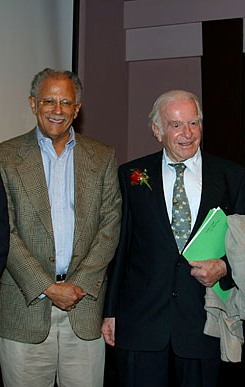
If you think you’re seeing double at this year’s Annual Meeting it’s not necessarily because of your grueling schedule here in Atlanta. For instance, that’s not one, but two NCAR scientists being honored with named Symposia this week. Today offers sessions honoring Joachim Kuettner; Thursday is reserved for Warren Washington.
Meanwhile, there were indeed two Businger’s at Sunday’s Fellows Reception. Father Joost was celebrated as one of the three new Honorary Members of the AMS, while son Steve was named a Fellow. We believe this is the first time one family has been so honored at the same Annual Meeting.
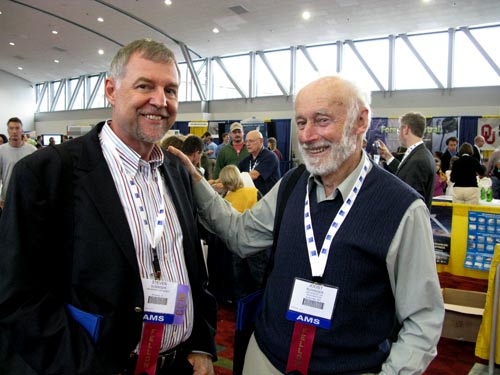
Fellows Honored at Review
At the Welcome Reception following the 90th Annual Review and Fellows Awards Sunday night, newly elected Fellows socialized with attendees at the Student Conference and Local Chapter Poster sessions, which were held in conjunction.



Public vs. Private: For Students, the Choice Is Theirs
Saturday’s Student Conference forum on “The Job Market” offered advice on what job hunters can expect in their career pursuits, and a clear theme of the discussion was the difference between employment in the private and public sectors. Trisha Palmer of the NWS Forecast Office in Peachtree City, Georgia, delineated many of the pros and cons of public sector work, noting the security, geographical flexibility, and benefits as some of the most positive aspects. Robert Baron, founder of Baron Services in Huntsville, Alabama, talked about some of the qualities that can lead to success in the private sector.
Additionally, Ryan Boyles of North Carolina State University noted that a new peril of job-hunting in the high-tech world is the plethora of personal information floating around the internet. Boyles recommended that students be very careful about putting personal pictures and other information online that could later be used against them in their job search.
Ultimately, all the speakers could agree that perhaps the most important advice they could give to the students is “do your best.”
Counting the Cards in Nature's Casino
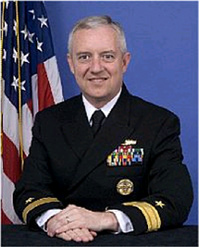
With “New Demands on Science and Services” being the theme of this AMS Annual Meeting in Atlanta, it is safe to say that no demand on climate science is more novel and complex than the national security angle of climate change. Strife in Africa is one area, as we mentioned here, but other flash points include the security of borders once covered by glaciers, water scarcity in numerous regions, and the newly navigable Arctic waterways.
It’s no wonder the Oceanographer of the Navy has gotten involved in this new area. Rear Admiral Dave Titley, oceanographer of the Navy, who has been charged with the U.S. Navy Task Force Climate Change, will be one of several national security experts featured in the two-part Tuesday Joint Session panel discussions (11 a.m. and 1:30 p.m.) on “Environmental Security: National Security Implications of Global Climate Change.”
In an interview on climate change with Armed Services radio, Admiral Titley showed a strikingly forward, mission-oriented viewpoint on the Navy’s interest in climate change, and not just the practical attitude of an officer with a research background.
“We’re operating in Nature’s casino,” he said, “and I intend to count the cards.”

